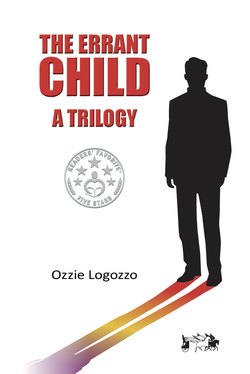Читать книгу The Errant Child - Ozzie Logozzo - Страница 8
Chapter 1
ОглавлениеVia Roma, Tarquinia, central Italy
I am only five years old so I do not think I am being smug. Perhaps a little but it is my birthday and I am very proud of how mamma is shielding my honor.
“Teresa, what kind of goddamn animal are you raising? Look at what Renzo did to my Sebastiano. For Christ’s sake, just look at what your little bastard did!”
What colorful, crude language from a petit, pretty lady. What is a bastard?
She looks rich. I like her stylish midi yellow dress belted by a glittering, oversized gemstone rosary but her twisted facial scowls are really starting to scare me.
At Sunday Mass, Mrs. Terrazzo is calm, almost angelic, while helping the priest to distribute the Eucharist: sacred bread denied me. I can understand refusing me a sip of wine that the priest denies everyone but what is just so wrong giving me the wafer to tide me over until lunch? I joined the reception line once with the rest of the churchgoers. One motherly head slap was sufficient to sit me back down and douse my appetite.
Mamma is standing at our doorway like a 160-pound Roman gladiator. She has not glanced at Sebastiano’s wound. Rather, she is solidly staring at his mom, eye to eye—a gaze quashing any notion of hospitality.
Our three-level, grey rectangular stone building sits within the center of the medieval town of Tarquinia, which, with its nearby necropolises, is proof of an ancient Etruscan civilization. Mamma feels more friendship with the remains of the six thousand graves cut out in the rocks just outside of town than with our neighbors.
Tarquinia’s narrow, winding Renaissance- era streets and row housing thwart privacy and secrecy. With outstretched arms, I can almost touch the grey, stone-cast buildings on either side along the streets. I live on Via Roma. Northern buildings bake in the sunshine. Southern buildings only partly shine golden. Sunrays rarely light east-west pavements. North-south crossroads fry each step I take.
It is a wonderful place to live. I have few friends. Sebastiano Terrazzo, pudgy and pleasant, is my best buddy. We attend the same kindergarten
class at the hilltop. We play soccer in the small square in front of St. Giovanni’s church; we run through narrow cobblestone pathways as if chased by griffins; and, share a pizza slice at the San Marco Café, across from Piazza Cavour, that Giuseppe Salvo, my neighbor, regularly treats us.
I love to win. Conquer. It issuch an energizing emotion. My fear of Sebastiano’s mother has passed. I continue to eat my fresh-baked panino, drenched in olive oil, while peering around from behind my mother’s military stance.
I eye my friend’s forearm with naïve curiosity. I am surprised to see the teeth gash. How did I get rid of the missing skin? Did I spit it out or swallow it? I smile and wet my lips. I sense my chest expanding just short from the point of launching one or two shirt buttons into Mrs. Terrazzo’s face. It must be natural pride, do you think? It brings to mind the day I took a hammer to the head of my demanding, teenage babysitter. One blow was enough to get my way.
Mamma patiently listens to the protestor’s high-class outcries: add-ons to other stings of small- town gossip. A spotlight always follows us shopping, strolling or attending the local opera house, my mamma’s singular satisfaction, escorted by hurtful chatter and finger pointing. Now the beam of shame shines into our home with neighbors coming together to survey and snicker.
I have accepted mamma’s suffering. Unwed motherhood brings screaming and physical abuse as single-parenting practices. I get it. I try my best to be a good son.
The woman calls mamma a strega (witch). Mamma smiles. I know she feels flattered. Philosophically, she has faith in pagan Stregheria (witchcraft). Safeguarding against this evil woman, mamma makes the sign of the horns with two of her fingers on each hand.
Mamma is tolerant but there are certain words best hidden from her. She is merciless when accused of being a lesser human being. She is a proud woman. She is not reserved when it comes to her beliefs.
To the lady’s horror, mamma attacks instantly to the label, ‘slut-shaming single mother’. With an eloquence that belies her status, mamma counters with an electrifying verbal assault. I, not understanding the words, relish the tone. The cowed woman and gentle son scurry away in horrified, stunned silence.
“Mamma, you were great!”
The stream of sunshine eclipses by what appears to be a dismembered, spiritual hand positioned to strike. Blinking, I am shaken by the evil-eye stares of my mother.
“Porco (pig). How dare you embarrass me,” she yells. Her stern look and clenched teeth devour me.
I did not see my mother’s strong arm coming.
All I can do is scream.
“No, no. Please don’t. Stop it! Stop it! I love you mamma. I…I can’t breathe!”
The beating is ruthless. Uninhibited blows smashevery part ofmy body. Nosoonerdoes another bullet hit its mark that a cannonball explodes.
The domestic disturbance echoes, at the speed of light, out the door and the small open window.
I see Giuseppe dashing through the open door. I do not see Esterina, his steadfast spouse, but I can hear her pleads shrouded in tears. Mamma is striking me with abandon with both hands accentuated by fierce kicks. I can’t speak. I have lost my voice.
Giuseppe jumps in struggling to get mighty mamma away from me. I cannot inhale. I am spastic. I have lost all feeling. I think I am dead.
I see Esterina grasping her own hair. She shouts, “Stop, you’re going to scar him for life. Dio mio, he’s dying!”
